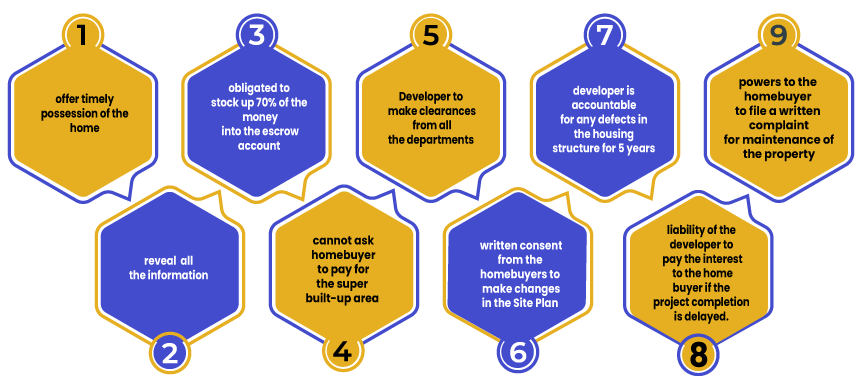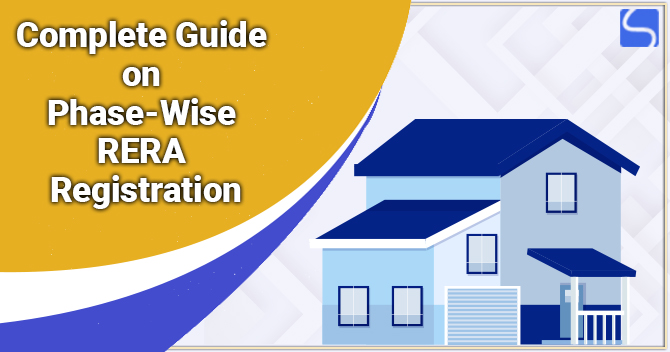Major benefits to Invest in Registered RERA Projects

Japsanjam Kaur Wadhera | Updated: Jan 05, 2021 | Category: RERA
The Real Estate Regulatory Authority (RERA) was introduced by the government of India on 26th March 2016 and from 1st May 2017, its provisions came into effect. The purpose of the act is to protect the homebuyers, create transparency into the real estate sector and provide prompt and speedy dispute redressal for the grievances of the consumers. The RERA Act does not leave any circumstances where the builder or the developer can escape themselves after selling a property through wrong ethics. Property purchase in the RERA project can be done easily through safely investing in the property, by the homebuyers. This article will provide you with information regarding the major benefits to invest in registered RERA projects.
Table of Contents
What are the benefits to invest in registered RERA projects?

- The benefit for a homebuyer to invest in registered RERA projects is that under it the developer has to offer timely possession of the home to the homebuyer. He is required to reveal or provide with all the information regarding the carpet area, a number of housing units and floor area ratio to the interested home buyers. Hence, the homebuyers can now invest in registered RERA projects after being fully satisfied.
- Under the registered RERA projects, the developer is obligated to stock up 70% of the money into the escrow account which is paid by the client. Such amount is completely and solely kept to build the project and not to be used personally or for any other project.
- The homebuyer cannot be asked by the developer to pay for the super built-up area under the registered RERA projects and the person is required to pay only for the carpet area.
- Under the registered RERA project, the developer is required to make clearances from all the departments such as fire, sewage, sanitation etc. the amenities and specifications that is promised by the developer is necessary to exist in a project. No changes can be done by him in the plan without the written consent of the buyers.
- Written consent must be taken from the homebuyers to make changes in the Site Plan. And amenity- enabled housing units must also be delivered by him as promised at the time of booking.
- The developer is accountable for any defects in the housing structure for 5 years from the time of possession, under the registered RERA project.
- It is the liability of the developer to pay the interest to the home buyer if the project completion is delayed. The prospect is paying to the bank the interest that is upon the EMI.
- The act strengthens and provides powers to the homebuyer to file a written complaint to the developer for the maintenance of the property up to 1 year from the time of possession in accordance with the after sales services.
Provisions suggesting to invest in Registered RERA Projects
Some of the important provisions suggesting to invest in registered RERA projects are as below:
- The provisions of the RERA Act[1], clearly states the documents that are to be attached by the promoter while registering RERA projects, which reliefs the home buyers from worries of all security issues.
The compulsion for a promoter to attach documents
It is compulsory for a promoter to attach the documents like allotment letter, land approval, agreement for sale and the conveyance deed that is to be signed with allottees, under Section 4 of the RERA Act, which eventually binds the developer to provide all of this to the home buyer.
Provide the reliability of the developer involved
The reliability to be provided of the developer involved in the registered RERA projects, information regarding the brief details like projects launched by the developer in the past 5 years, being developed or already completed, completion and all pending cases against the developer etc all these information are submitted during RERA registration application in accordance to Section 4 of the RERA Act, 2016.
- Section 11 of the RERA Act defines the duties of the promoter, which binds the promoter lawfully to follow the below mentioned duties and relieves the buyers from any worries while dealing with the property.
- Section 17 of the Act provides the execution of registered conveyance deed of the plot, building or apartment in favour of the allottee along with the undivided proportionate title in the common areas to the association of competent authority or allottees, as the case may be.
- Be responsible for obtaining the occupancy certificate or the completion certificate or both as applicable from the relevant competent authority as per the local laws or other laws for the time being in force. Also to make it available to each allottee or the association of allottees, as the case may be.
- The Section 13(1) of the RERA Act states that not more than 10% of the cost of the apartment can be taken as advance by a promoter and the application fee before an agreement for sale has been made. This provision has helped the buyer to safeguard against malpractices that earlier use to happen.
- Section 14(3) of the RERA Act states that any defect in the workmanship or structural defect, service or quality is discovered within 5 years after the possession of the apartment. And it is the duty of the builder to rectify the defects within 30 days without any cost. In case the builder fails, the buyer will be entitled to claim compensation.
- The Section 12 of the RERA Act states that where any person makes an advance or the deposed based on the information specified in the prospectus or notice advertisement or based on any model building, apartment or plot, and suffers any damage or loss due to any false or incorrect statement included therein, the promoter shall be liable to compensate it.
Conclusion
The provisions of the RERA Act helps the home buyers to invest in the registered RERA projects carefully after being satisfied with all the information and other aspects of the project. It helps him to invest in the property safely. After the framing of the RERA Act, it is mandatory for all the upcoming housing and commercial projects to register on the RERA portal of that particular State by 31st July 2017.
Also, Read: What is the Compliance of RERA under State?














